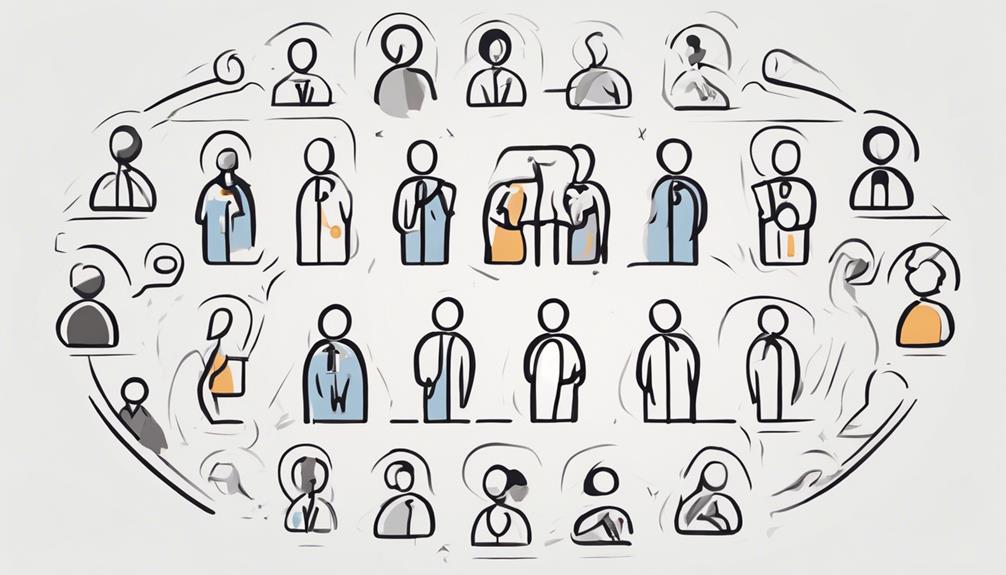In contemplating the essence of a good society, one must consider the intricate interplay of various elements of societal structure and function. From the principles of equity and justice to the promotion of social harmony and cooperation, each facet contributes to the tapestry of a well-functioning community. The discussion on what truly defines a good society delves into the complexities of human interactions, governance structures, and cultural norms that shape our collective existence. By exploring the core values that underpin societal well-being and examining the mechanisms that drive prosperity and inclusion, we embark on a journey to uncover the blueprint for an ideal society.
Key Takeaways
- Core values like care, respect, and integrity foster a well-functioning society.
- Equity principles ensure fair resource distribution and justice for all.
- Democratic governance with public participation enhances societal effectiveness.
- Embracing diversity, promoting inclusivity, and celebrating cultural differences strengthen societal cohesion.
Core Values for Society

Core values such as care, respect, integrity, involvement, and volunteering serve as the foundational pillars essential for the construction of a well-functioning society. These values are not only individual virtues but also collective assets that contribute to the cohesion and prosperity of a community. Care, as a fundamental value, entails a genuine concern for the well-being of others and the environment in which they live. Respect forms the basis for harmonious interactions within a society, fostering understanding and appreciation for diversity. Integrity, the alignment of actions with ethical principles, ensures trust and accountability among members of the community. Involvement encourages active participation and engagement, leading to a sense of ownership and responsibility towards common goals. Volunteering, a selfless act of giving time and resources for the betterment of society, exemplifies the spirit of communal support and solidarity. Together, these core values lay the groundwork for a society built on compassion, cooperation, and shared prosperity.
Principles of Equity and Justice
Equity and justice are fundamental pillars in establishing a harmonious society. Fair distribution of resources ensures that all individuals have equal access to opportunities, while equal rights for all promote a balanced and inclusive community. Access to justice further solidifies these principles by upholding fairness, preventing injustices, and fostering a society where all members can thrive.
Fair Distribution of Resources
Ensuring a just and equitable distribution of resources within society is paramount for fostering a harmonious and stable social framework.
- Fair distribution of resources promotes equal access to opportunities and reduces disparities in wealth and power.
- Principles of equity and justice advocate for balancing individual needs with societal well-being to cultivate a harmonious society.
- Addressing income inequality and wealth concentration is essential for promoting social justice and enhancing overall societal stability.
Equal Rights for All
In the pursuit of a just and inclusive society, the foundational principles of equal rights for all individuals play a crucial role in shaping the fabric of social order and cohesion. Equal rights ensure fairness, justice, and the protection of human rights for every member of society, fostering a sense of belonging and inclusivity. Upholding principles of equity and justice involves addressing systemic inequalities and discrimination, aiming to create a level playing field where everyone has equal opportunities and access to resources. This commitment to equal rights promotes social cohesion, trust, and respect among diverse communities, laying the groundwork for a society built on empathy, understanding, and shared prosperity.
| Principles of Equity and Justice |
|---|
| Fairness and Justice |
| Protection of Human Rights |
| Equal Opportunities |
| Addressing Systemic Inequalities |
Access to Justice
Accessing justice within a society governed by principles of equity and justice requires a comprehensive framework that prioritizes fair treatment and equal legal opportunities for all individuals.
- Society must ensure that legal resources are equally accessible to all, irrespective of socio-economic status or background.
- Discrimination, bias, and favoritism must be actively prevented within the legal system to uphold fairness.
- Equitable distribution of resources and opportunities is essential to promote social cohesion and reduce disparities in accessing justice.
Structures for Prosperity and Well-being
A critical aspect of fostering prosperity and well-being in society lies in the establishment of robust societal structures that prioritize the fulfillment of basic needs and the promotion of social justice and equity. Access to necessities such as food, shelter, healthcare, and safety forms the foundation for a good society where human life can thrive. Balancing individual aspirations for material wealth with the collective well-being of the community is essential. Creating a conducive environment for the upbringing of children significantly contributes to overall societal well-being. Social justice and equity serve as pillars for constructing structures that support prosperity and well-being in society. Empowering citizens to actively participate in decision-making processes and addressing global challenges are pivotal for building sustainable structures that foster prosperity and well-being in a good society.
| Structures for Prosperity and Well-being | Aspects to Consider |
|---|---|
| Access to basic needs | Food, shelter, healthcare, safety |
| Balancing individual desires with collective well-being | Finding a harmonious equilibrium |
| Healthy environment for children | Contributing to societal well-being |
| Social justice and equity | Fundamental for prosperity |
| Empowering citizens and addressing global issues | Key aspects for well-being |
Social Harmony and Cooperation

Social cohesion within a community is the bedrock upon which social harmony and cooperative relationships are built, fostering a resilient and integrated society.
- Peaceful Coexistence: Social harmony thrives when individuals respect each other's differences, leading to peaceful coexistence and a sense of belonging within the community.
- Collaborative Efforts: Cooperation acts as a catalyst for progress by encouraging individuals to work together towards common objectives, leveraging their unique strengths and skills.
- Empathy and Inclusivity: Promoting empathy and inclusivity cultivates a culture of understanding and acceptance, enabling diverse voices to be heard and valued in decision-making processes.
Environmental Sustainability Practices
Fostering environmental sustainability practices is fundamental in ensuring the long-term health and vitality of our planet, necessitating a shift towards conscious resource management and eco-friendly initiatives. Environmental sustainability practices aim to strike a balance between human needs and ecological preservation, safeguarding a habitable Earth for future generations. Vital components of these practices include reducing waste, conserving energy, and promoting renewable resources to uphold environmental well-being. Techniques like sustainable agriculture, including organic farming and permaculture, are instrumental in maintaining soil health and biodiversity. Furthermore, initiatives such as recycling and upcycling are essential in minimizing waste production and alleviating the pressure on natural resources, thereby fostering a more sustainable society. Embracing eco-friendly transportation methods like biking, walking, and public transit not only reduces carbon emissions but also fosters a cleaner environment. By incorporating these environmental sustainability practices into our daily lives, we can contribute to a healthier planet and ensure a sustainable future for all.
Democratic Governance Systems

Democratic governance systems are built on the foundation of voting rights, essential for citizens to have a say in decision-making processes. Public participation is a vital component, ensuring that diverse voices are heard, and policies reflect the needs of the population. Accountability and transparency are crucial elements that uphold the integrity and effectiveness of democratic governance systems.
Voting Rights Importance
In the realm of governance systems emphasizing civic engagement and participation, the significance of voting rights cannot be understated.
Key Points:
- Democratic Participation: Voting rights are essential in democratic governance systems, allowing citizens to have a say in decision-making processes.
- Representation and Accountability: The right to vote enables individuals to shape policies, elect representatives, and hold leaders accountable for their actions.
- Historical Struggles: Throughout history, the fight for voting rights has been central to democratic movements, leading many nations to expand suffrage and promote inclusivity in political processes.
Public Participation Vital
The active engagement of the public in decision-making processes within democratic governance systems is foundational to ensuring accountability and transparency. Public participation plays a crucial role in upholding the principles of democracy by allowing citizens to have a voice in shaping policies that directly impact their lives. By involving the public in policy formulation and implementation, governments can benefit from a diverse range of perspectives, leading to more inclusive and responsive decision-making. Furthermore, public participation fosters a sense of ownership and empowerment among citizens, strengthening the social contract between the government and the governed. Ultimately, a democratic system that values and encourages public participation not only enhances the legitimacy of government actions but also paves the way for a more just and effective society.
Accountability and Transparency
Effective governance hinges on the unwavering commitment to upholding accountability and transparency in decision-making processes.
- Political institutions in democratic governance systems promote accountability by ensuring that leaders are held responsible for their actions and decisions.
- Transparency in these systems fosters trust among citizens and enhances the legitimacy of governmental actions.
- Accountability mechanisms, such as oversight bodies, audits, and public access to information, are vital components of democratic governance to prevent corruption and abuse of power.
Education and Knowledge Sharing

Education's pivotal role in shaping individuals' knowledge, skills, and competencies for personal and societal advancement cannot be understated. Access to free education at all levels is crucial for fostering a well-informed and progressive society. Investing in education not only equips individuals with the necessary tools for success but also leads to a more prosperous and innovative society with higher levels of economic growth. Knowledge sharing and educational opportunities play a vital role in promoting social mobility, equality, and a more inclusive society. A strong educational system contributes significantly to the overall well-being and development of individuals, communities, and the nation.
| Benefits of Education and Knowledge Sharing | |
|---|---|
| Equips individuals with necessary skills | Fosters a well-informed society |
| Promotes social mobility and equality | Leads to economic growth |
| Cultivates innovation and prosperity | Enhances overall well-being |
| Supports inclusive and progressive society | Contributes to national development |
| Provides tools for personal and societal advancement |
Economic Stability and Equality
In a well-functioning society, economic stability and equality are foundational pillars that underpin sustainable growth and social cohesion.
- Economic stability in a good society ensures consistent growth, low unemployment rates, and sustainable development. When the economy is stable, businesses can plan for the long term, individuals have confidence in their financial security, and investments in infrastructure and innovation can flourish.
- Equality in wealth distribution fosters social cohesion, reduces poverty, and promotes a fair and just society. When wealth is distributed more equally, disparities in living standards decrease, leading to a more harmonious and inclusive community where all members feel valued and have opportunities to thrive.
- Access to quality education and healthcare for all individuals contributes to economic stability and equality in a good society. By ensuring that all members have access to essential services, a society can empower its citizens to participate fully in the economy, reducing inequalities and promoting overall well-being.
Community Engagement and Support

Engaging with the community plays a pivotal role in fostering social cohesion and enhancing overall well-being. Community engagement encompasses a range of activities that bring individuals together, creating opportunities for social connections, reducing feelings of isolation, and promoting a sense of belonging. Support networks within communities play a crucial role by offering emotional, practical, and social assistance to individuals in times of need. Active participation in community initiatives not only strengthens the community fabric but also provides individuals with a sense of purpose and shared responsibility.
Moreover, strong community support systems have been linked to mental health resilience and positive societal outcomes. By collaborating on various projects and initiatives, communities can create a more inclusive, cohesive, and supportive environment for all members. This collaborative effort fosters a sense of unity and empowerment among individuals, leading to a more resilient and connected society. In essence, community engagement and support are fundamental pillars in building a good society where individuals thrive collectively.
Safety and Security Measures
A paramount consideration in fostering a good society lies in the implementation of robust safety and security measures.
Key Safety and Security Measures:
- Low Crime Rates and Efficient Emergency Response Systems: Maintaining low crime rates and having swift emergency response systems in place are crucial components of ensuring the safety of individuals within a society. This involves effective law enforcement strategies and timely assistance during emergencies.
- Surveillance Technologies for Enhanced Public Safety: The deployment of surveillance technologies like CCTV cameras and facial recognition systems can significantly enhance safety and security in public spaces. These tools help in monitoring activities, deterring criminal behavior, and aiding in investigations.
- Community Engagement and Collaborative Initiatives: Programs such as community policing, neighborhood watch, and crime prevention strategies foster a sense of unity and shared responsibility among residents. Collaborative efforts between government authorities, private security firms, and community members strengthen safety measures, promoting a secure living environment for all.
Cultural Diversity and Inclusion

Cultural diversity and inclusion are essential components of a thriving society, fostering creativity, understanding, and social cohesion. Embracing differences and building an inclusive community not only enriches perspectives but also leads to reduced discrimination and increased tolerance. Unity in diversity offers a platform for problem-solving, innovation, and ultimately, societal prosperity.
Unity in Diversity
Diversity within a society serves as a catalyst for innovation, creativity, and a vibrant exchange of traditions and perspectives, contributing to its overall richness and vitality.
- Strength in Unity: Embracing cultural diversity fosters a sense of unity among individuals with varied backgrounds, promoting a cohesive society.
- Shared Understanding: Inclusivity ensures that all members of society feel valued and respected, leading to a shared understanding and appreciation of different cultures.
- Harmony Through Diversity: By recognizing and celebrating cultural differences, a good society can achieve harmony and cooperation among its diverse cultural groups.
In essence, unity in diversity creates a robust foundation for a society where differences are embraced, leading to a more vibrant and inclusive community.
Embracing Differences
Recognizing and embracing the multitude of cultural perspectives within a society is essential for fostering inclusivity and promoting a cohesive community fabric. Cultural diversity within a society contributes to the development of creativity, innovation, and problem-solving skills, all of which are essential components of a good society. Inclusive societies, where different cultural backgrounds are respected and understood, cultivate tolerance and mutual respect among individuals. The diverse perspectives brought about by cultural differences enrich decision-making processes, leading to more comprehensive solutions to societal challenges. Embracing differences not only enhances social cohesion and reduces conflicts but also fosters a sense of belonging for all members of the community. Inclusion of diverse voices and experiences creates a vibrant and dynamic cultural tapestry, essential for building a strong and resilient society.
Inclusive Community Building
In fostering an inclusive community, the active promotion of cultural understanding and equity across various societal dimensions is paramount.
- Cultural diversity in a society enhances community cohesion by celebrating different traditions, languages, and beliefs, fostering a sense of unity.
- Inclusion initiatives within community building strive to provide equal opportunities for individuals irrespective of race, ethnicity, gender, or socioeconomic status, promoting a feeling of belonging and acceptance.
- Embracing cultural diversity and inclusion in community building not only fosters innovation and creativity but also broadens perspectives, leading to more effective problem-solving and decision-making processes.
Frequently Asked Questions
What Are Qualities of a Good Society?
Community engagement is a vital aspect of a good society, fostering social cohesion and collective problem-solving. It promotes a sense of belonging, participation, and shared responsibility among citizens. Through community engagement, individuals actively contribute to decision-making processes, leading to more inclusive policies and programs. This involvement strengthens social bonds, enhances trust between members, and ultimately contributes to the overall well-being and sustainability of society.
What Are Factors of a Good Society?
Factors of a good society encompass community engagement, where individuals actively participate in decision-making processes. This involvement fosters a sense of belonging and ownership, leading to social cohesion and collective well-being. Moreover, effective governance, equitable resource distribution, and inclusive policies contribute to a healthy societal framework. Community engagement serves as a cornerstone for building trust, fostering collaboration, and addressing diverse needs within a society. How can active citizen involvement shape the fabric of a thriving community?
What Determines a Good Society?
Social cohesion in a society is determined by the level of unity, cooperation, and mutual support among its members. Factors such as shared values, trust, and inclusivity play a significant role in fostering social cohesion. When individuals feel connected to one another, respect diversity, and work towards common goals, it contributes to the overall well-being and stability of the society. Ultimately, social cohesion is a key determinant of a good society.
What Do You Mean by Good Society?
Social harmony in a good society denotes a state where mutual respect, empathy, and cooperation prevail among members. It signifies a harmonious coexistence where conflicts are resolved amicably, and collective well-being is prioritized. This equilibrium fosters a sense of unity, trust, and shared values, creating a conducive environment for progress and prosperity. In essence, social harmony encapsulates the essence of a good society by promoting peace, equity, and a sense of belonging for all individuals.
Conclusion
In conclusion, a good society can be likened to a well-tended garden, where diverse flowers bloom harmoniously in a balanced ecosystem. By upholding core values of equity, justice, and sustainability, societies can thrive and flourish like a flourishing garden. Through structures promoting prosperity, social harmony, and environmental sustainability, a good society can achieve collective well-being and ensure a bright future for all its members.
